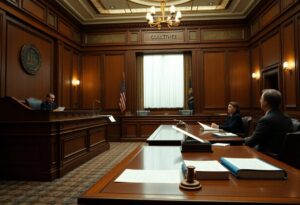What Should Teachers Do When Wrongfully Accused by DCF?
Imagine a world where teachers, often seen as heroes to their students, face a harsh reality when someone makes wrongful accusations to the Department of Children and Families (DCF) and instead of there being teachers in a classroom, there are teachers in DCF cases. Early one chilly morning, Mr. Thompson, a dedicated and beloved science teacher, was shocked to receive a letter stating he was under investigation by DCF for allegations he knew nothing about. The claim stated he was negligent during a school trip, accusations that could tarnish his 20-year career and good standing in the community.
Caught in a whirlwind of confusion and fear, Mr. Thompson felt like a hero stripped of his cape, and suddenly turned into a villain in the eyes of those he had vowed to serve. Teachers in DCF cases face a harsh wake-up call that brings to light the dark shadows cast by DCF investigations over educators. It’s a glimpse into the emotional turmoil and professional havoc that can ensue from DCF’s actions.
Are you an educator facing a similar DCF case? Are you battling against seemingly insurmountable odds to clear your name? Do you know other teachers in DCF cases? Keep reading to uncover critical steps and strategies to navigate this daunting ordeal and reclaim your reputation in the educational realm.
Understanding Your Rights as Teachers in DCF Cases
Teachers in DCF cases have a crucial responsibility to know exactly what their rights are when they are under DCF scrutiny.
In Massachusetts, where education and child welfare are taken seriously, the laws are designed to ensure that every teacher has the opportunity to defend themselves properly against any accusations.
Here, we break down these rights into clear, actionable steps to help you navigate this challenging process.
Your Rights Explained
- Right to Legal Representation: Before you engage with DCF or participate in any interviews, it’s imperative to consult with a lawyer who specializes in DCF cases. This is your fundamental right.
- Right to Access Evidence: You are entitled to view any evidence DCF has against you. This includes the right to know the nature of the accusations and any materials used in the case against you.
- Right to a Fair Hearing: If DCF makes an adverse decision following their investigation, you have the right to a fair hearing where you can defend yourself against the charges laid out.
Navigating the Initial Response to DCF Allegations
When faced with allegations from DCF, the initial steps you take can significantly impact the outcome of your case. This section guides educators through the critical early stages of a DCF investigation, emphasizing the importance of quick and informed actions.
Gather Documentation and Evidence
Compiling a comprehensive set of documents and evidence is fundamental in defending against DCF allegations. This section outlines the types of documentation that can help clarify the situation and potentially exonerate the accused.
Types of Documentation to Collect
- Witness Statements: Collect statements from colleagues, parents, and other witnesses who can provide firsthand accounts that support your version of the events.
- Professional Records: Gather any performance reviews, awards, and recognitions that highlight your professionalism and dedication as an educator.
- Educational Materials: Include copies of lesson plans and student assignments relevant to the incident in question, which may demonstrate the educational context of your interactions.
How to Organize Documentation
- Chronological Order: Arrange documents by date to provide a clear timeline of events.
- Categories: Group similar documents together, such as communications, official
records, and personal notes.
- Digital Copies: Ensure you have digital backups of all documents, stored securely in a cloud-based service or external drive.
What to Expect During DCF Investigations
A DCF investigation can be intense and invasive, often involving a thorough review of your interactions with students and observations of your teaching environment. A good lawyer can guide you through what to do and say. Understanding the depth and nature of these investigations can prepare you for the process and help mitigate undue stress.
Investigation Process
- Initial Screening: DCF starts with a screening to determine if the complaint warrants a full investigation. This includes reviewing the allegations and any immediate evidence. DCF often contacts known collaterals/witnesses during this initial period.
- 51B Investigation: If the case moves forward, expect detailed interviews with potential witnesses, including fellow teachers, students, and possibly parents. DCF may also request access to your classroom to observe your interactions with students.
- Outcome and Follow-Up: Depending on their findings, DCF may close the case, offer recommendations, or in severe cases, take further action with the District Attorney (DA). Each step is documented and can be reviewed by your legal team.
Long-Term Impacts and Managing Professional Reputation

Being accused can change how people see you. Work to clear your name right away. You might want to talk to others who can support you and share your true story.
Managing Your Professional Reputation
- Immediate Response: Act swiftly to address the accusations. This includes possibly making public statements through an attorney that clarify your position without compromising your legal standing.
- Transparent Communication: Keep open lines of communication with your employer, colleagues, and the parent community, where appropriate, to maintain trust and support.
- Documenting the Process: Keep detailed records of all interactions and decisions related to the case, as these documents can be crucial for any future legal or professional challenges.
Support Networks and Professional Resources
Find groups and people who can support you. They can give you emotional support and share ways to deal with the stress of being involved with DCF.
Identifying Support Networks
- Professional Associations: Many educational organizations offer resources and support for teachers in DCF cases or that are otherwise facing legal and professional challenges. These groups often provide access to legal advice, counseling services, and peer support forums.
- Community Groups: Local community centers and online groups can offer a platform to connect with others who have faced similar accusations. These connections can provide moral support and advice based on firsthand experiences.
How to Leverage Professional Resources
- Legal and Psychological Support: Consider engaging a therapist who specializes in professional stress and crisis management, as well as a lawyer who understands educational law and DCF cases.
- Educational Workshops and Seminars: Participate in workshops that focus on legal rights, professional ethics, and crisis management within the educational sector. These can provide valuable insights and strategies for protecting your career.
Key Takeaways
Understanding your rights and quickly managing allegations is crucial to teachers in DCF cases. Engaging a specialized attorney, keeping detailed records, and transparent communication can defend against wrongful accusations and safeguard your career. Proper preparation and support can significantly impact the outcome.
Protect Your Reputation with the Law Office of Kevin Seaver—Call Us Today!
If you’re a teacher facing wrongful accusations in a DCF case, or you know teachers in DCF cases, the stakes couldn’t be higher—not just for your career but for your reputation and future. At the Law Office of Kevin Seaver, we specialize in navigating the complexities of DCF investigations, assessments, and fair hearings. With extensive experience in defending educators, we understand the nuances of these cases and are prepared to help protect your rights and restore your good name.
Don’t wait to seek help. Contact us today at (617) 263-2633 to schedule a consultation and start taking control of your situation. Let us advocate for you and guide you through this challenging time with the expertise and dedication you deserve.
If you find yourself in this situation, it’s advisable to seek legal representation from a qualified attorney, like those at the Law Office of Kevin Seaver, who can advocate for your rights and guide you through the complex process of a DCF investigation.
Remember that the ultimate goal of DCF is to ensure the safety and well-being of children while supporting families in crisis.
Please note that this article does not create an Attorney-Client relationship between our law firm and the reader and is provided for informational purposes only. Information in this article does not apply to all readers.
Readers should not rely on this information as legal advice and should seek specific counsel from the attorney based on personal circumstances. Thank you.
Kevin Patrick Seaver is a Massachusetts DCF Defense Lawyer who represents parents against false child abuse allegations.





